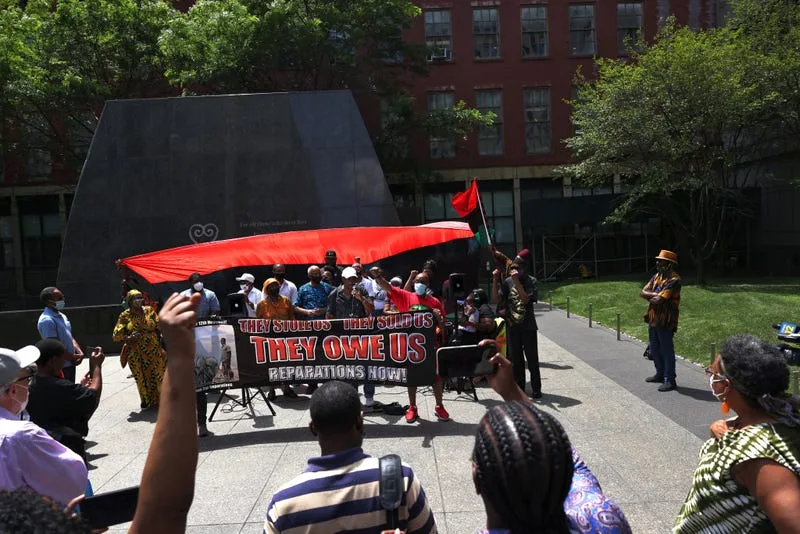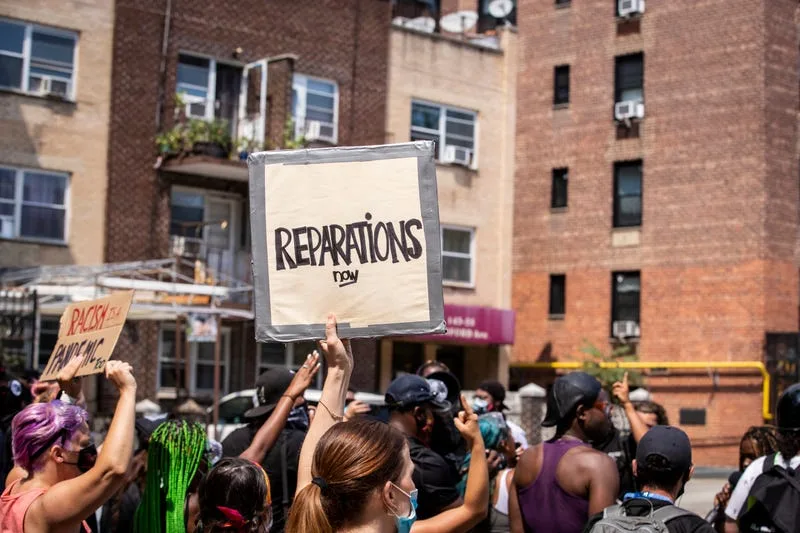NEW YORK (1010 WINS/WCBS 880) – Gov. Kathy Hochul signed a law Tuesday that makes New York the second state to create a task force to study reparations for the descendants of enslaved African people.
Hochul signed the legislation at the New York Historical Society on the Upper West Side, saying it would help “right the wrongs of the past” and acknowledge “the painful legacy of slavery in New York.”
“Today, I challenge all New Yorkers to be patriots and rebuke, not excuse, our role in benefitting from the institution of slavery,” the governor said at the signing, which came six months after the state Legislature sent the bill to her for consideration, and three years after California formed a commission.
A 2021 Pew Research Center study found Americans are sharply divided along racial lines over reparations for slavery, with 77% of Black voters supporting reparations and 80% of white voters opposing them. A majority of Hispanic and Asian voters were also opposed, at 58% and 65%, respectively.
“To those who think that even having this conversation is unfair or wrong, I say it would be wrong not to have it,” Hochul said to applause.
“Let’s be clear about what reparations means. It doesn’t mean fixing the past, undoing what happened. We can’t do that, no one can. But it does mean more than giving people a simple apology 150 years later,” Hochul said. “This bill makes it possible to have a conversation, a reasoned debate about what we want the future to look like.”
The bill authorizes the creation of a nine-member “New York State Community Commission” to examine the extent to which the federal and state government supported the institution of slavery, as well as how the state engaged in the transfer of enslaved Africans. It would also address persistent economic, political and educational disparities experienced by Black people in the state today, officials said.
New York Assembly Speaker Carl Heastie, who is the first Black person to hold the position, said the bill is a “momentous occasion in New York history.”
“African Americans have been subjected to racial, economic, and institutional injustices that have plagued our communities for decades – a reality we must still acknowledge,” Heastie said in a statement.
State Senate Majority Leader Andrea Stewart-Cousins, the first Black woman to head a legislative chamber in the state, called the bill “transformative.”
“Together, New York can shape a future marked by justice and equity,” she said in a statement.
Hochul, Heastie and Stewart-Cousins, who are all Democrats, would each appoint three members to the commission.
The governor’s office said the nine commission members will be “especially qualified to serve by virtue of their expertise, education, training or lived experience in the fields of African or American studies, the criminal legal system, human rights, civil rights, reparations organizations and other relevant fields.”
The commission would be required to deliver a report one year after their first meeting. Their recommendations, which could potentially include monetary compensation for Black people, would be non-binding.
The Queens Democrat who sponsored the bill, state Sen. James Sanders, told the Daily News back in June that “America’s original sin must be resolved.”
“Today, we plant a seed of hope, not just for the City of New York and New York State, but for the nation,” Sanders said in part in a statement Tuesday.

Photo credit Michael M. Santiago/Getty Images
According to the bill, the first enslaved Africans arrived at the southern tip of Manhattan Island, then a Dutch settlement, around the 1620s and helped build the infrastructure of New York City. While the state Legislature enacted a statute that gave freedom to enslaved Africans in New York in 1817, it wasn’t implemented until 10 years later in 1827.
Before the American Revolution, enslaved Africans accounted for 20% of New York’s population, while 40% of colonial New York households owned enslaved Africans, according to the governor’s office.
The new law is likely to draw some controversy, especially with the possibility of cash reparations. Indeed, there was spirited debate in New York’s Assembly and Senate before lawmakers passed the bill in June.
During floor debates, Republican state Assemblymember Andy Gooddell said, “I’m concerned we’re opening a door that was closed in New York State almost 200 years ago.”

Photo credit Ira L. Black/Corbis via Getty Images
Gooddell, who voted against the bill, said at the time that he supports existing efforts to bring equal opportunity to all and would like to “continue on that path rather than focus on reparations.”
Some critics of reparations by states say that while the idea is well-intentioned, it can be misguided. Some say the federal government has the financial capacity to pay reparations and that it should be held responsible.
In California, the reparations task force said in their report that the state is estimated to be responsible for more than $500 billion due to decades of over-policing, mass incarceration and redlining that kept Black families from receiving loans and living in certain neighborhoods. California’s state budget last year was $308 billion. Reparations in New York could also come with a hefty price tag.
Other state legislatures that have considered studying reparations include New Jersey and Vermont, but none have yet passed legislation.
On the federal level, a decades-old proposal to create a commission studying reparations has stalled in Congress.
The Associated Press contributed to this report.


